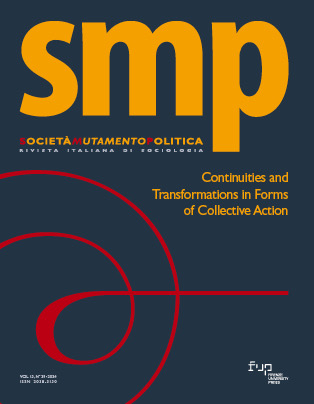All Growing but Differently: Two Ideal-typical Forms of Continuity and Expansion Followed by Young German Activists
Published 2024-07-23
Keywords
- activism,
- abeyant-experimental,
- lineal sustained,
- political engagement
How to Cite
Copyright (c) 2024 Lia Duran Mogollon

This work is licensed under a Creative Commons Attribution 4.0 International License.
Abstract
This paper seeks to further the discussions about what continuity in activism can look like, about the differentiated trajectories that activists can follow and how growth and continuity (as trait shared by all activists) might be differently patterned by factors at the micro- meso- and macro- levels. For this, the present analysis zooms into the trajectories of 9 activists and proposes two ideal typical kinds of trajectories (the abeyant-experimental and the lineal sustained) based on the patterns of growth, expansion, and change as narrated by the participants. The interview analysis suggests that activism has been experienced as an in-flux process during which growth and change have been constant. Participants report about gaining specific skills, expanding their networks, adopting new routines and repertoires of action, adopting different frames of cognition and even a experiencing changes in their self-perception due to their political engagement. The study proposes an analytical concept to further the analysis of activist trajectories and stress the differentiated expressions of growth and expansion revealed by activists.
References
- Alteri L., Leccardi C. and Raffini L. (2017), «Youth and the Reinvention of Politics. New Forms of Participation in the Age of Individualization and Presentification», in Partecipazione e Conflitto, 9(3): 717-747. https://doi.org/10.1285/i20356609v9i3p717
- Boltanski L. and Chiapello E. (2005), «The New Spirit of Capitalism», in International Journal of Politics, Culture, and Society, 18(3-4): 161-188 https://doi.org/10.1007/s10767-006-9006-9
- Blee K. M. and Taylor V. (2002), «Semi-structured interviewing in social movement research», in B. Klandermans and S. Staggenborg (eds.), Methods of social movement research, University of Minnesota Press, Minneapolis, pp. 92-117.
- Bosi L., Lavizzari A. and Voli S. (2022), «Comparing Young People’s Participation across Political Organisations from a Life Course Perspective», in Journal of Youth Studies, 25(4): 433-451. https://doi.org/10.1080/13676261.2021.1892618
- Bunnage L. A. (2014), «Social movement engagement over the long haul: Understanding activist retention», in Sociology Compass, 8(4): 433-445. https://doi.org/10.1111/soc4.12141
- Busse B., Hashem-Wangler A. and Tholen J. (2015), «Two Worlds of Participation: Young People and Politics in Germany», in Sociological Review 63(2): 118-140. https://doi.org/10.1111/1467-954X.12265
- Coe A. B., Wiklund M., Uttjek M. and Nygren L. (2016), «Youth Politics as Multiple Processes: How Teenagers Construct Political Action in Sweden», in Journal of Youth Studies 19(10): 1321-1337. https://doi.org/10.1080/13676261.2016.1166191
- Corrigall-Brown C. (2012), «From the balconies to the barricades, and back? Trajectories of participation in contentious politics», in Journal of Civil Society, 8(1): 17-38. https://doi.org/10.1080/17448689.2012.665650
- Corrigall-Brown C. (2020), Patterns of protest, Stanford University Press, Stanford.
- Crossley N. (2004). «Not being mentally ill: Social movements, system survivors and the oppositional habitus», in Anthropology & Medicine, 11(2): 161-180. https://doi.org/10.1080/13648470410001678668
- Crossley N. (2003), «From reproduction to transformation: Social movement fields and the radical habitus», in Theory, culture & society, 20(6): 43-68. https://doi.org/10.1177/0263276403206003
- Dalton R. J. (2017), The participation gap: Social status and political inequality, Oxford University Press, Oxford.
- Davis G. F., McAdam D., Scott W. R. and Zald M. N. (eds.). (2005), Social movements and organization theory, Cambridge University Press, New York.
- Downton J. and Wehr P. (1998), «Persistent Pacifism: How Activist Commitment is Developed and Sustained» in Journal of Peace Research, 35(5): 531-550. https://doi.org/10.1177/0022343398035005001
- Earl J., Maher T. V. and Elliott T. (2017), «Youth, activism, and social movements», in Sociology Compass, 11(4): e12465. https://doi.org/10.1111/soc4.12465
- EURYKA (2019) Integrated Report on Biographical Analysis (Deliverable 6.2). www.unige.ch/sciences-societe/euryka/files/6315/8046/8943/EURYKA_D6.1.pdf
- Fillieule O. (2013), «Political Socialisation and Social Movements», in D.A Snow, D. Della Porta, B. Klandermans and D. McAdam (eds.), The Wiley-Blackwell Encyclopedia of Social and Political Movements, Malden, MA, Wiley. https://doi.org/10.1002/9780470674871.wbespm199
- Fillieule O. and Neveu E. (eds). (2019), Activists Forever? Long-term Impacts of Political Activism. Cambridge University Press.
- Gaiser W., De Rijke J. and Spannring R. (2010), «Youth and political participation–empirical results for Germany within a European context», in Young, 18(4): 427-450. https://doi.org/10.1177/110330881001800404
- Goodwin J., Jasper J. M., Polletta F. (eds). (2009), Passionate politics: Emotions and social movements. University of Chicago Press, Chicago.
- Gozzo S. and Sampugnaro R. (2017), «What Matters? Changes in European Youth Participation» in Partecipazione e Conflitto, 9(3): 748-776. https://doi.org/10.1285/i20356609v9i3p748
- Kiess J. (2021), «Class Against Democracy? Family Background, Education, and (Youth) Political Participation in Germany», in M. Giugni and M. T. Grasso (eds.), Youth and Politics in Times of Increasing Inequalities, Basingstoke: Palgrave, pp. 29-56.
- Klanderman B. (1997), The Social Psychology of Protest, Blackwell, Oxford.
- Mattoni A. (2014), «The potentials of grounded theory in the study of social movements», in Methodological practices in social movement research, 2: 21-42.
- McAdam D. (1989), «The biographical consequences of activism», in American sociological review, 54 (5): 744-760.
- Norris P. (2002), Democratic Phoenix: Reinventing Political Activism, Cambridge University Press, Cambridge.
- Passy F. and Giugni M. (2000), «Life-spheres, networks, and sustained participation in social movements: A phenomenological approach to political commitment», in Sociological Forum 15, (1): 117-144.
- Pickard S. (2019), Politics, protest and young people: Political participation and dissent in 21st century Britain, Palgrave Macmillan, London.
- Pilkington H., Pollock G. and Franc R. (2018), Understanding youth participation across Europe, Springer Germany, Berlin.
- Polletta F. and Jasper J. M. (2001), «Collective identity and social movements», in Annual review of Sociology, 27(1): 283-305.
- Spannring R., Günther O. and Wolfgang Gaiser, (eds). (2008), Youth and Political Participation in Europe: Results of the Comparative Study EUYOUPART, Leverkusen-Opladen: Barbara Budrich-Esser.
- Strauss A. and Corbin J. (2008), Basics of qualitative research: Techniques and procedures for developing grounded theory, Sage, Thousand Oaks.
- Tarrow S. (2008), «Charles Tilly and the practice of contentious politics», in Social Movement Studies, 7(3): 225-246. https://doi.org/10.1080/14742830802485601.
- Taylor V. (1989), «Social movement continuity: The women’s movement in abeyance», in American Sociological Review, 54, (5): 761-775. https://doi.org/10.2307/2117752

